THE SISTERS OF MERCY: 1982-1985
A Merciful Release: The Sisters of Mercy’s early catalogue continues to surprise and entrance me via the sheer unadulterated cool of their Suicidal Stooges brilliance. I pick some personal highlights.
ACID ON THE FLOOR
I was born in 1970. Too much of a baby to witness punk first-hand and just a year or two too young to be aware of the first wave of Goth and its heyday.
Caught in the purgatory beyond the thrill of The Scene.
It’s always antagonised me, like a teasing cousin that never outgrows the joy of a wind-up. The resentment has never left me.
Yet equally, by coming to it when I did - late 1984-ish, there was already a wealth of exciting back catalogues to explore - Bauhaus had been and gone and left one of the most flawlessly exciting discographies in their wake. The Cure has just released The Top - and The Head On The Door was just around the corner; the impact that Inbetween Days would have on my teenage psyche was considerable.
PiL had introduced themselves to me by not writing a love song. Alien Sex Fiend were a grotesque and addictive d-d-dead and buried enigma. The Damned were a favourite from the moment I heard I Just Can’t Be Happy Today and The Sisters of Mercy had released a string of such devastatingly cool singles that we were all salivating at the thought of their incoming debut LP.
So, in many ways, despite lamenting the void of not seeing any of those bands play live with early-career energy, the wealth of content and the mystique that my juvenile mind created around these elusive aliens made them more impactful and, I would argue, directly led them to riding shotgun with me for the next 40 odd years.
All of them made an everlasting impression, but perhaps the most significant was The Sisters of Mercy.
THE SISTERS, MARK ONE.
I’m calling Sisters Mark One the Gary Marx era.
Once he left, post-First and Last and Always, they became a different beast - more rock than goth.
All Jim Steinman bombast instead of electrified, self-produced, lo-fi magnificence.
Ben Gunn’s input should not be underestimated either - between he and Marx, The Sisters Mark One had a harsh and hooky twin-guitar sound that drilled deep into my teenage cortex.
And it never left.
Coupled with Eldritch’s supremely visual lyrics, delivered via that baroque and booming baritone - as well as Doktor Avalanche’s crashing DR55/TR808 clatter - they were towering beacons of individuality, style and Raw Awesome.
They sounded like no one else.
Once The Sisters Mark One dissolved in a flurry of controversy in 1985, the two years between Wake and This Corrosion seemed like a lifetime, with only the difficult doom of The Sisterhood and the spangly pop of The Mission there to sate the need for more Sisters.
The first was moody enough, but the songs just didn’t hit home, and the latter had arena rock aspirations which fell a bit flat in the credibility stakes.
As fun as they were - and they really were - history hasn’t been so kind to The Mission as it has to The Sisters. Retrospectively, their light and spangly semi-psychedelic rock seems to have more in common with Simple Minds and U2 than Suicide and The Stooges.
The true greatness of The Sisters of Mercy is in their first run of immaculate singles.
Every release, impossibly, hotly, anticipated.
Once Wayne Hussey started co-writing at the expense of Gary Marx and Andrew Eldritch, they lost a little bit of their edge. The 12-string guitars and light melodies of First and Last and Always were as far as they could get from the electric bursts of Adrenochrome, without sounding like an entirely different beast.
The LP gets unfairly maligned in some quarters but to me, it’s a good - if not great - way to bring the first phase of a brilliant band to an end.
As much as I loved This Corrosion, it was the dawn of an era signified by Eldritch’s face on the record sleeves, rather than the awesome, cryptic and mysterious artwork that preceded that period.
He had fulfilled his motivating rock and roll dream, but had lost the band’s primal attraction in the process.
Once they got to Vision Thing, the sad transformation into shitty arena metal band was complete. There were occasional highs, but far more embarrassing lows.
Even the enigmatic Floodland, to me, is a patchy affair compared to their earlier work.
So we’re focusing on highlights of their early years.
Don’t argue.
The Merciful Releases - 1982-1985, from Body Electric to Some Kind of Stranger.
MERCIFUL RELEASES ‘82-’85
The Sisters of Mercy’s first release was Damage Done, in 1980.
It is mentioned here for completion’s sake, but the truth is that it was a less than remarkable debut that had few of the signature elements that would create such a devastating presence by the time their lineup had solidified with the addition of Ben Gunn and Craig Adams.
The first release in terms of this article’s focus, is Body Electric.
1982:
The alternative musical landscape was birthing some timeless LPs in 1982: Pornography, The Sky’s Gone Out, Junkyard, Hex Enduction Hour, Strawberries, Combat Rock… nothing was standing still.
There were kinetics at play that meant everything seemed to have an inventive momentum attached to it; a force eager to do something new and different.
The Sisters of Mercy entered this roiling climate armed only with tinny guitars that they could barely play, a first-gen drum machine with scant sounds, and a bucket-load of charisma and self-belief.
It was all they needed to create a seismic impact.
BODY ELECTRIC/ADRENOCHROME
CNT PRODUCTIONS
I remember the first time I heard both of these songs.
I can even recall the type of cassette it was - a Maxell tape, recorded for me by a school friend, Andy Brown. That tape had The Sisters on one side and Dead Kennedys on the other.
A fundamentally profound selection of songs.
Beyond Alice - and even Temple of Love - as great as they and their B-Sides were - it was Adrenochrome that stood out by a mile for me. I played and replayed it - trying to decipher the words and thinking how ace the self-referential lines were.
Still today, the lyrics resonate, and the tune itself is so addictive that it stays with you for days after any listening session.
“The catholic girls now
Stark in their dark and white dread in monochrome
The sisters of mercy
High tide, wide-eyed, sped on Adrenochrome.”
It was so fucking enigmatic.
The harsh shards of guitars and the whispering high-hats of The Good Doktor made me think the recording was shitty in the best possible way, but that hiss, it turned out, was all part of the aesthetic.
What a way to begin a career.
I held the seven inch in my hands once, but, alas, the funds required - even back then - made it prohibitively expensive. It is the white whale of all white whales.
Flip it over and the twin to Adrenochrome, Body Electric, in all its primitive glory, sends tingles from your tips to your toes.
Seeming to deliberately relate the riffs and structures between the two songs further cemented the bold attitude of The Sisters - they didn’t give a fuck about showcasing the different aspects of their songwriting. They had fallen on a hooky riff and were rinsing it for all it was worth - or at least, they were willing to work on variations on a theme.
Utter genius, in the spirit of Ramones, The Stooges, Suicide and Motörhead.
Originally released on The Mekons’ label, CNT, and later as a Merciful Release, Body Electric/ Adrenochrome is an absolutely perfect single, and the ultimate debut.
ALICE
MERCIFUL RELEASE
I can’t help but consider Alice as the archetypal Sisters single. It was their first bona-fide indie hit, and surely any Sisters live performance would feel entirely unfulfilling if Alice wasn’t present in all her schizophrenic glory?
Alice defined the Sisters’ sound to a wider audience and stamped their mark on rock history. It also birthed a whole generation of children named in her honour.
Lyrically, Eldritch was still dealing in bedsit tales of drugs and paranoia - though this time, downers instead of uppers, further cementing iconography that the band would use to promote their rock and roll intellectualism:
“Alice pressed against the wall
So she can see the door
In case the laughing strangers call
And crush the petals on the floor
Alice in her party dress
She thanks you kindly, so serene
She needs you like she needs her tranqs
To tell her that the world is clean”
They conjure a scene that is so well-defined, domestically familiar and memorable.
Eldritch was on the path to becoming a true genre-leading lyrical master, and his stall was well and truly set out with Alice.
Even Doktor Avalanche was getting in on the iconography. The tapping of his high hat and solitary metronomic bass drum serves as an unforgettable intro that absolutely defines the song to come.
And as for the guitars - the dueling descent of Marx and Gunn establishes one of the most memorable key riffs in rock - a riff that is only accentuated by the slashing chords of the pre-chorus climb.
It’s so well choreographed and structured. The drama perfectly under-pinned by Craig Adams’ calm and stoic, no-frills, root note bass playing.
The iconic 12” version of the release wouldn’t be released for a few months, but when it was, the additional tracks on it further established the band as providers of ludicrously good value singles. The B-Sides almost always competed with their lead tracks for quality and classic status.
Such is the case here - with Floorshow (the B-Side of the 7”) and Phantom (on the 12”) continuing that “twin song” aesthetic that the band began with Body Electric and Adrenochrome.
Both Floorshow and Phantom share DNA without overwriting each other and certainly, Floorshow became as integral to the Sisters’ shtick and set-lists as Alice did, with its equally iconic “slow-slow-quick-quick-slow” backing being almost child-like in its simplicity and identifiable addictiveness.
Another aspect of the 12” established one more cornerstone of The Sisters’ iconography - the classic cover version - this time an immaculate representation of The Stooges’ 1969.
Live, they would be tackling such diverse songs as Jolene, Emma, Gimme Gimme Gimme (A Man after Midnight), Knocking on Heaven’s Door and even Stairway to Heaven - farting in the face of their perceived pretensions.
They were clearly having fun toying with preconceptions.
Other covers were included as B-Sides in the future, end every one an unexpected, high-camp winner.
And with that, 1982 came to an end. A super-productive and defining year for the band that, miraculously, they would only build upon, and up the ante of, the following year.
1983:
1983 was a magical year for underground music.
The Post Punk Pound was spread skeletally thin across first-class releases from The Birthday Party, Bauhaus, The Cure, The Fall, Marc and the Mambas, Lords of the New Church, Alien Sex Fiend, Death Cult, Chameleons, Echo and the Bunnymen and even U2 were reaching their credibility apex with both War and Under A Blood Red Sky.
And that’s just the cream.
So many more fantastic records were released that year, so to consider 1983 as just another growth period on the way to peak Sisters is even more incredible.
ANACONDA
MERCIFUL RELEASE
The single that seems to get the most forgotten - or at least disregarded - is Anaconda. I understand why; it’s the least memorable of the run and the least iconic. The hooks are more subtle.
The lyrics less punching, but still evocative:
“Baby finger on the trigger
Baby shot formaldehyde
Turn into a marble figure
Turn the matter dead inside
Turn into a china doll
Maybe go to the final ride
Baby go to where I don’t follow
Baby to the other side”
It seems to be a musing on a funeral parlor’s overdosed resident, the contemplation of a corpse. It just lacks the personal relatability of Alice or the masterful lines of Body Electric. Even though its narrative is very much the predictable next step of that story-arc.
That said, it still pisses all over much of the competition - and as a song, it absolutely grows on the listener - but there is little of anything remarkable to note about it.
Even the artwork avoids the impact and mystique of the previous singles. It’s a silver-printed version of Alice Cooper’s Billion Dollar Babies LP sleeve.
Doktor Avalanche feels like he’s tired. His patterns are rote and uninspired. The instrumentation lacks any form of real surprise.
Despite all that, I don’t dislike the song - it just doesn’t compare to the rest of the run - it lacks the trademark iconography that the other singles demonstrate so strongly.
It is a great B-side, but as the first punch of 1983, it’s slightly disappointing.
It was also only available on 7”, so there wasn’t the opportunity to revel in a plethora of other songs, just Phantom, the same song that would appear on the Alice 12” that would be just around the corner.
It feels a bit lazy.
THE REPTILE HOUSE EP
MERCIFUL RELEASE
To many of the hardcore Sisterhood, The Reptile House EP is the ultimate Sisters statement.
To the band too, it felt like the peak of their artistry at the time. Its brooding, glacially-paced epic songs certainly display a maturity and a willingness to push their own boundaries, by going beyond “pop” and making the fan-base work for their reward.
It was the first Sisters record I bought, and still, to this day, it is their most difficult release to fully appreciate.
It takes time and investment, but ultimately, the required dedication is worth it.
“I thought 'The Reptile House' was our finest hour yet because it was the most serious record we ever made, but it was also the most perverse.
Everything about that record is perverse.
It's really slow, it's really long, and I just love the way all the lead lines are hidden in the mix, involved in all the effects, completely submerged, you really have to fight with that record.
… there's no escape from The Reptile House.“
Andrew Eldritch, 1983
The songs display some of Eldritch’s best lyrics - and, as legend has it, he created the entire thing himself in the cellar of Sisters HQ - the rented house at 7 Village Place, Leeds, where he lived with Marx.
It shows a singularity of vision more than any other record of theirs.
For me, Valentine is the pick of the bunch, as it grinds slowly on, Eldritch seemingly bemoans our couching love affair with televised destruction, disaster and wasted life - both on and off screen - and how humanity has devolved:
“A shiny love song, a quick incision
Cut him down on television
A people come to this
Beyond the age of reason
A people fed on famine
A people on their knees
A people eat each other
A people stand in line
Waiting for another war
Waiting for my valentine”
Kiss, Fix and Burn are equally devastating - lyrically and in terms of their elephantine scale and pace.
The Reptile House offers an entirely new side to The Sisters, beyond their releases thus far.
The maturity is staggering for a band, lest we forget, still in the first full year of their true incarnation and having only just given up on University.
They were no longer teenagers, (at least, three of them weren’t) but still - the world-weary wisdom Eldritch was conveying lyrically belied his youthful vigor.
Check out Fix, as an essay on socialism:
“Love for the party, love for the nation
Love for the fix, for the fabrication
Love for the corpse of the corporation
Love for the death, for the defecation”
At the height of Thatcher’s Britain, The Sisters’ hometown of Leeds, UK - and its surrounding townships - were receiving kick in the balls after kick in the balls, as the Tories calmly and effectively destroyed the spirit of the working man.
Eldritch was sympathetic to that and his rage and indignation came out most strongly on The Reptile House.
THE TEMPLE OF LOVE
MERCIFUL RELEASE
What can you say about Temple of Love that hasn’t been said before?
From the entirely addictive guitar lines to Eldritch’s lyrics and vocal performance, the song is impeccable and timeless. For many people, it is not only the quintessential Sisters song, it’s the quintessential goth song.
An anthem for the poetically disaffected.
The true mastery was in its embrace of the 12” single. It was one of the first really successful extended versions of a song for that format that bettered its punchier 7”, radio-friendly cousin. The structure and extra value that the extended song provides makes it the archetypal and iconic version.
The one true Temple.
When Eldritch decided to re-create it in 1992 and rinse it for all it was worth, its new incarnation was better produced with a more varied composition - and it scored them more commercial success than the original - but it was so weak in comparison to the original song. The overblown wailing and Steinmanisms did nothing to enhance the perfection that already existed and had been repeatedly requested on dance-floors across the Western world for nine years.
So that reinterpretation aside, what makes Temple of Love so compelling?
It was the clearest representation of Eldritch’s vocals up to that point. His voice was elevated in the mix, so the beauty of his lyrics - and the memorability of line after line of them - became a focal point for the song.
In many ways, it was the song that made Eldritch the Godfather of Goth.
The unmistakable cool of his presence, the intelligence that came through in his lyrics and the texture of the composition as a whole made for an unbeatable recipe. The song was an anthem that appealed beyond genre, catchy as fuck and haunting as Hammer.
Temple of Love is an icon in itself.
So many great lines in one song:
“And the Devil in a black dress watches over
My Guardian Angel walks away
Life is short and love is always over in the morning
Black wind come carry me far away”
Possibly my favourite couplet of all time.
Or take the second addendum to the repeated bridge:
“In the black sky thunder sweeping
Under ground and over water
Sounds of crying, weeping will not save
Your faith for bricks and dreams for mortar
All your prayers must seem as nothing
Ninety-Six below the wave
When stone is dust and there remains
The only haven you can trust”
Cor! It still sends shivers.
Call it pretentious if you like, but to me it’s what lyric-writing is all about and the advances Eldritch was making on the form are distinguished; learning tricks to play with repetition, spins on similar phrases and devastatingly impactful iconic imagery.
The apocalyptic message is delivered with such drama, dealing with the loss of faith and the futility of life in a relationship once fascination fades.
At least, that’s how I interpret it.
But who cares? It has a Devil in a black dress as its centre-piece, for fucks’s sake.
The composition climbs and lulls, aided entirely by the nagging and elevating central guitar riff that cycles through a hundred down-strokes to provide one of the most doomily buoyant licks ever.
The false end at the climax of the 7” duration, only for Doktor Avalanche to pick up the pace again and grow into an ever more delirious rush of drama for another three or four minutes is genuinely perfectly timed, themed and directed.
It exposes Eldritch as a Svengali par excellence - with Ben Gunn, Gary Marx and Craig Adams falling back from the spotlight into an integral, vital and wonderful supporting role. No one is fighting for attention, they are just driving the song so Eldritch can stand at the front, Marlboro Red in a be-gloved hand, aviators disguising expression, hiding eyes that stare down the acolytes at his feet, who stare up in turn, at the cool electric messiah he has become.
It is breathless, timeless and awesome.
But the thrills didn’t stop there. Amazingly, the 12” is backed with two songs that genuinely support the extended Temple of Love with the strength of concrete foundations. Heartland, with its repetitive, mantra-like refrain that lasts for half the song, and their fantastic interpretation of the Stones’ classic Gimme Shelter are wondrous B-Sides for such an effective single.
I still get shivers when Eldritch’s lone vocal utters out at the end:
“War
Children; it’s just a kiss away
Kiss away
Kiss…
… Away”
It is so powerful, deadpan and non-fuckable-with that it smashes the original song into smithereens. Especially as it’s set against the light touch of the guitars and the sensitive interpretation of the composition, Eldritch’s voice shines.
He could do no wrong.
Temple of Love instigated conversations with major labels, one of whom was Warner Brothers. From now on, Merciful Release would be a subsidiary, backed by the big bucks of Bugs Bunny.
Just before that happened though, Ben Gunn decided to leave The Sisters, tired of the clashes with Eldritch and the Rockist direction that the band was going in.
Upon returning from their first American tour, the young guitarist - he was still a teenager - left the band to return to University.
He has barely been heard of publicly, since.
Ben Gunn was soon replaced by Wayne Hussey.
He had played guitar in Liverpool band Dead or Alive, but becoming disillusioned with the more electronic direction they were taking (and where they’d find their fame), he was keen to join a band that would welcome his more Ledden pretensions.
Although I consider the songs beyond this point almost uniformly ace, I equally dislike the change in sound that Hussey brought to The Sisters.
Gone were the harsh and mechanical doom-bots of their singles - and incoming was the paisley spangle of his 12 strings and acoustic guitars.
That Zepped-up direction worked loads better for Hussey in The Mission, but bringing it into the Sisters - regardless of who instigated it - weakened them and they lost some of their unique grind, replacing it with a light and flowery disruption that is retrospectively disappointing. It feels like an intrusion now, though at the time, less so. We were just so pleased to have more material to drool over.
I would love to hear the songs of ‘84 and ‘85 without the fluffy shimmer - with more dry space and less of Hussey altogether. I think the songs would stand the test of time better and the production would sound more definitive.
Regardless, I still include the Hussey years within my Mark One definition.
1984:
There was a lull in the Sisters’ camp for the first half of 1984.
Presumably it was dedicated to getting Hussey up to… erm… speed and writing new material, because once everyone was locked in place, the band came alive again with a flurry of gigs and new releases.
BODY AND SOUL
MERCIFUL RELEASE / WEA
The first new material from The Sisters in 1984 was Body and Soul.
Once again, it’s a refined release that takes a little effort to embrace. It’s fair to say that it wasn’t the punching rock anthem people may have been expecting in the wake of Temple of Love, and its sales were comparatively disappointing.
However, spend some time with it and the EP becomes a key release; not just for the cracking title track and its spiritual foreshadowing of Marian (in my mind), but for the extra tracks included on the 12” - a re-recorded version of Body Electric, and new songs Train and Afterhours.
Body and Soul sounds sad. Eldritch is in lamentation mode, expressing depth; for the three and a half minute run-time, he’s no longer the strident frontman, fearless and frowning. Instead, he becomes distant; ethereal.
“All your hidden faces
Your seven veils unfold
Give me forbidden places
All your tales untold
Give me forever and always
Ever and always; body and soul”
It’s the most laid back and removed the band have sounded thus far.
For that reason alone, it’s a significant step. It’s not a funereal pace like the songs from The Reptile House - it’s more hollow than that.
Perhaps that’s also because it was Hussey’s first credit as a Sister.
It’s followed by a long overdue re-hash of Body Electric, that gives it more power and bass. More defined guitar work. Eldritch higher in the mix.
It’s seen as controversial in some quarters, but I love it. Gary Marx’s guitar is so scratchy and harsh. Adam’s bass is rolling and octaving all over the place. Perhaps it lacks the raw energy of the original, but what it loses in spirit, it gains in coherence.
I wish they’d done the same with Adrenochrome too.
Train sounds like vintage Sisters, with an Alice-like lead line and Eldritch way back down in the mumbling mix. It rolls along its tracks fairly uneventfully, but wins prizes for its early-days aesthetic. At least from me.
Afterhours is a maudlin and sprawling masterpiece that only reveals itself through patience and a willingness to discover its charms. Eldritch’s voice is impeccable:
“One more night spent on your mirror
A Black Maria in your eyes
This stuff so strange and lonely
England fades away in your eyes"
It’s so marvelously spare, it is enthralling.
A pulsing bass tone, an e-bowed drone and a mumbling Eldritch barely parting his lips to utter the words.
A flawless ode to amphetamine futility in a dark and sweaty New York City night.
Eldritch was going off the rails and Afterhours was diarising his experience.
WALK AWAY
MERCIFUL RELEASE / WEA
Much maligned, Walk Away exemplifies, for many, where things went wrong for The Sisters. It’s held up as the perfect example of Hussey’s hollow pop writing and, along with Black Planet, considered to be a low point of these early years.
I’ve read that from a few different sources over time, but I still can’t quite see what their problem is. Sure, it’s no Temple of Love, but it is a really well-crafted single that continues to punch through, 40 years later.
I love Eldritch’s lyrics and wondering if it really IS a paean to his dissolving relationship with Marx.
What it definitely does display, in full form, is the spangle of Hussey’s guitar. Instead of the electric acid glass-shattering lead lines that we’ve come to expect as a staple, the music that backs Eldritch is more orchestrated; layers of guitars have softened their sound and commercialised it.
That doesn’t mean it’s shit, because it’s not. Although, I think I agree with the common opinion that it works better on First and Last and Always as the second track on Side One, often cited as the moment the album really takes off.
But we’ll get to that.
The true high point of the EP, for me, is Gary Marx’s Poison Door.
Another one that’s often disparaged, but I loved it at first listen and I still go back to it and hold it up as an example of a great B-Side. It begins with those ‘proper’ riffs and yes - it does dissolve a bit into Hussey’s waftyness, but not offensively so, and Eldritch is really on form, lyrically:
“Behind the door
Where dreams descend
And shadows smile
And kiss your memory goodbye…”
Somehow he makes that so anthemic. I love it.
Not quite so much the third track of the 12”, On The Wire, despite it’s powerful lyrics, the tune feels like it was written to be a B-Side; there’s something disposable about it, and the spangle becomes nauseating at times, really needing Gary Marx and Craig Adams to add definition to its meandering.
That said, I steadfastly refuse to agree with those of the Sisterhood who insist that Walk Away is a poor EP.
It’s not. But IS a new direction. One that’s smoother; rough edges polished away, layers of instrumentation at the expense of impact.
A sign of what to expect the following year.
1985:
It felt to me like goth (and all that that implies) reached its first apex in 1985.
What began with In The Flat Field and had grown with Closer, Juju, Prayers on Fire and Pornography had defined itself through Red Lorry Yellow Lorry, Love and Rockets and Dead Can Danse - and The Sisters.
After First and Last and Always, Goth became a bigger deal; more out in the open.
Fields of the Nephilim pranced in their flowery hats. The Cure repeatedly bothered the charts with their winsome pop, the Smiths’ miserablism made it alright to feel despondent and The Mission and the reinvigorated Sisters, in 1987, served to raise the corpse from its underground crypt to an overground walking dead presence that no one (ahem) batted an eye at.
In 1985, the Cure released The Head on the Door, Killing Joke’s Night Time, with lead single Love Like Blood, seemed to be everywhere. Phantasmagoria was seriously defining the Vanian aesthetic in The Damned camp and Samhain, The Cult and The Jesus and Mary Chain were all releasing stellar LPs.
But after that point, thing started to go awry; the college rock of latter day Hũsker Dü and Meat Puppets was sewing the seeds for the proto-grunge of Sonic Youth and Dinosaur Jr. A transition was coming - one that was less dramatic and atmospheric. One that specifically downplayed the pomp that (perhaps) The Sisters were guilty of.
So - while it certainly didn’t feel like the death-throws of a genre, it did feel like the first wave of goth was peaking.
Not least of all because The Sisters finally released an album.
NO TIME TO CRY
MERCIFUL RELEASE / WEA
No Time To Cry is moderately disappointing as a lead single for the LP, coming as it did just a week before the album.
There’s nothing wrong with the song - it’s a highlight of the long player, but is it a single?
Not really, as much as I like it.
And to back it with the forgettable and simplistic Blood Money feels like a cheap promo ploy by Warners.
Which of course it was, but with The Sisters’ reputation for an impeccable run of singles, it seems such a shame to end on a weak one that’s not even redeemed by the slightly more captivating Bury Me Deep, that echoes Afterhours from the year before, but with a more dominant presence of the trilling Hussey, which is something of a damp squib.
It just felt a little lackluster.
After the release of the LP it’d be two years before we heard anything else from The Sisters at 45RPM and, as exciting as that would be, it was an entirely different entity which bore almost no resemblance to the greatness of that first run of singles.
FIRST AND LAST AND ALWAYS
MERCIFUL RELEASE / WEA
To be abundantly clear; I love First and Last and Always.
It has been so since my first experience of it, upon its release (give or take).
It is genuinely an album that contains nine bangers and one ringer, which is easily forgiven (Possession, FYI).
I could endlessly shower the LP with meaningful accolades. It really was a formative one for me.
And yet, as the culmination of the three years we have been considering, it is with a bit more of a fizz than a bang that it ends the run of classic Sisters releases.
That statement says more about the astonishing quality of the singles and EPs that preceded it than it does of the album itself. Taken in isolation, it is incredible. Considered as the third act of a timeless tale of escalating success, less so.
As I write this, coincidentally, it is the LP’s 40th birthday. It does NOT sound middle-aged at all. It still sounds surprisingly contemporary. Many of the other records listed at the start of this chapter, by other artists, have aged far more significantly. It’s astonishing that it’s as old as it is.
So why does it fizz and not bang?
The Hussey thing is one reason.
Side One is predominantly given over to Hussey writing credits and it contains the more ROCK numbers - from the much-maligned (FWIW, I disagree), Black Planet, with its apocalyptic lyrics - less cryptic and interesting than previous efforts - to fan-favourite (FWIW, I disagree), Marian, with its lovelorn loneliness that struck a whimsical chord with bedsit-bound teenagers across the nation.
Another reason might be that all of the songs sound more traditional than the band’s previous work. More traditionally composed, structured and played. A very worthy shot into the chart-bound void of acceptability, but less challenging and raw than what had come before.
Lastly, Eldritch seems to have tamed his lyric writing somewhat. Perhaps writing in such volume was a challenge; there are rumours that he was somewhat disengaged at the time, which might account for the lack of timeless lines across the LP.
TBF, it was probably down to his own timeless lines that the songwriting suffered a bit.
All of those things combine to create a solid, but imperfect LP. There’s no Alice-beater or Temple of Love-contender. Nothing as elegantly dismal as Valentine.
Perhaps its unfair to expect there to be.
Highlights for me are Walk Away, which works perfectly in its situation on the LP, feeling like it kicks the album off proper, after the prologue exposition of Black Planet.
A Rock and a Hard Place is undoubtedly my favourite track on Side One. Lyrically and musically it’s the most interesting, with Craig Adams’ staccato bassline and Eldritch’s lyrics elevating it above the other songs on the first side:
“She wanted a haven and a place to hide
So I gave her an alibi, took her inside
A rock and a hard place await for me
Between the devil and the deep blue sea
Everything I ever did right or wrong
Hid out of sight, where I belong”
It’s a song full of mystery and enigmatic storytelling, which has continued its allure now for four decades.
Another highlight on Side One is No Time To Cry, which, like Walk Away, works better as an album track than a single.
It took a while for me to embrace Gary Marx’s lead riff to First and Last and Always.
It kicks off Side Two with a jaunty, Celtic jig, which felt like it was taking the piss until it clicked, mainly because of Eldritch’s lyrics again, particularly the mention of ‘hand-me-down dresses’, that somehow aligns the song all the way back to the start, with Alice’s party apparel. That line suddenly lent the song more substance to me and it became a favourite.
I really dislike Possession. I’ve tried to love it, but its faux funk and hookless lyrics and guitar lines just fail, for me. I hate to say it. It lets the side - and the LP down.
BUT
The true genius of the album is revealed in its… erm… wake: the triumvirate of wonder that leads us out of the album is absolutely its highlight.
Beginning with the IMMACULATE Nine While Nine, with its hook-tastic lead-line and 20:51 tale of train station anticipation - waiting for either a visitation or an escape.
“Lipstick on my cigarettes
Frost upon the window pane
Nine while nine and I’m waiting
For the train”
In a time long before every entitled teenager expected their own personal vehicle immediately, upon passing their driving test, countless hours were spent waiting. At Bus Shelters, at Train Stations, in Lay-bys and in Phone Boxes.
The lyrics sum up the hope and fear of that perfectly.
It’s followed by the similarly profound Amphetamine Logic.
The good old tales of speeding through the wee hours; that trad Sisters’ reliable go-to, return.
This time though, instead of smelling like patchouli and curry sauce trouser stains, it’s cleaned its act up. The instrumentation is more mature and Eldritch’s lyrics are more concerned with the observation of the users, or at least the time-lapsed people surrounding him, than the taking part himself.
He’s the third-person self-aware witness this time, rather than the first-person paranoid hero of his past vignettes.
Marx’s spidery guitar lines are so atmospheric, too. It’s a killer track, whose role is as the passage to the epic Some Kind of Stranger.
I think it might be the ultimate Sisters song.
It roles ever on, triumphant in its misery.
Lyrically, it is poignant in its simplicity and repetition, an ode to lost love - or love that just passes by, unrequited:
“And memories may last for years
But names are just for souvenirs
Some kind of angel, let me look into your eyes
Come here, I think you’re beautiful
I think you’re beautiful, beautiful
Some kind if stranger, come inside”
And with that, one of the cornerstones of goth (whether they agree or not), fades to black.
And, after finally having his fill of Eldritch, once the LP was done, Gary Marx vacated the guitar stool.
The Sisters would see out the year as a three piece, but once Craig Adams and Wayne Hussey left too, this incarnation were no more.
A leave of absence was required and taken by everyone.
ONLY AIR REMAINS
Purposefully – The Sisters of Mercy would never recapture that energy and raw steel that Gary Marx and Ben Gunn brought to them.
God knows, they would become pompous when Eldritch was left to his own devices.
Floodland’s fine, but it doesn’t timelessly nag at The Cool like the first records did.
And don’t get me started on the post-Floodland, Rockist nonsense of Vision Thing.
How horribly disappointing.
Even more so live, at that time.
It was the only time I saw them, and I never want to see them again.
They were awful.
But for those first three golden years, The Sisters of Mercy were truly spectacular and even still – those songs are mind-blowing in their simplicity, punch, attitude, effortless impact and style.
And, thankfully, they always will be.
I wish I’d been just that three years older, so I could have witnessed it all first hand.
Such is life.
Ave, Doomsters!






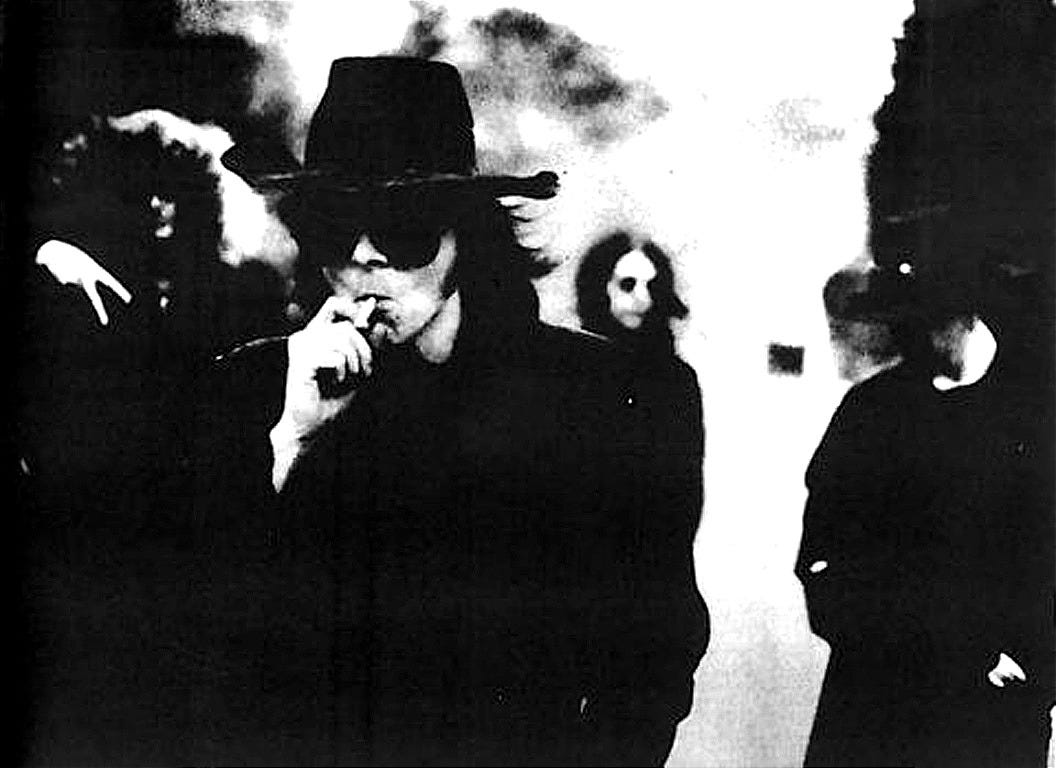
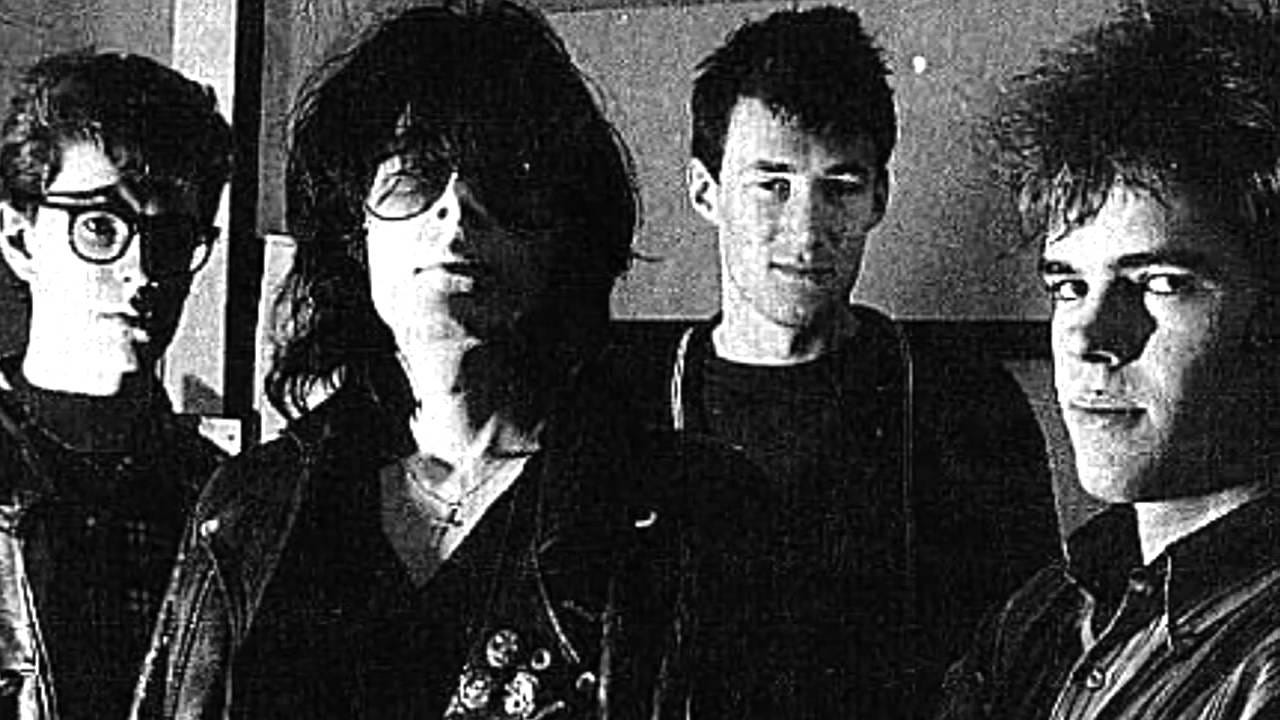
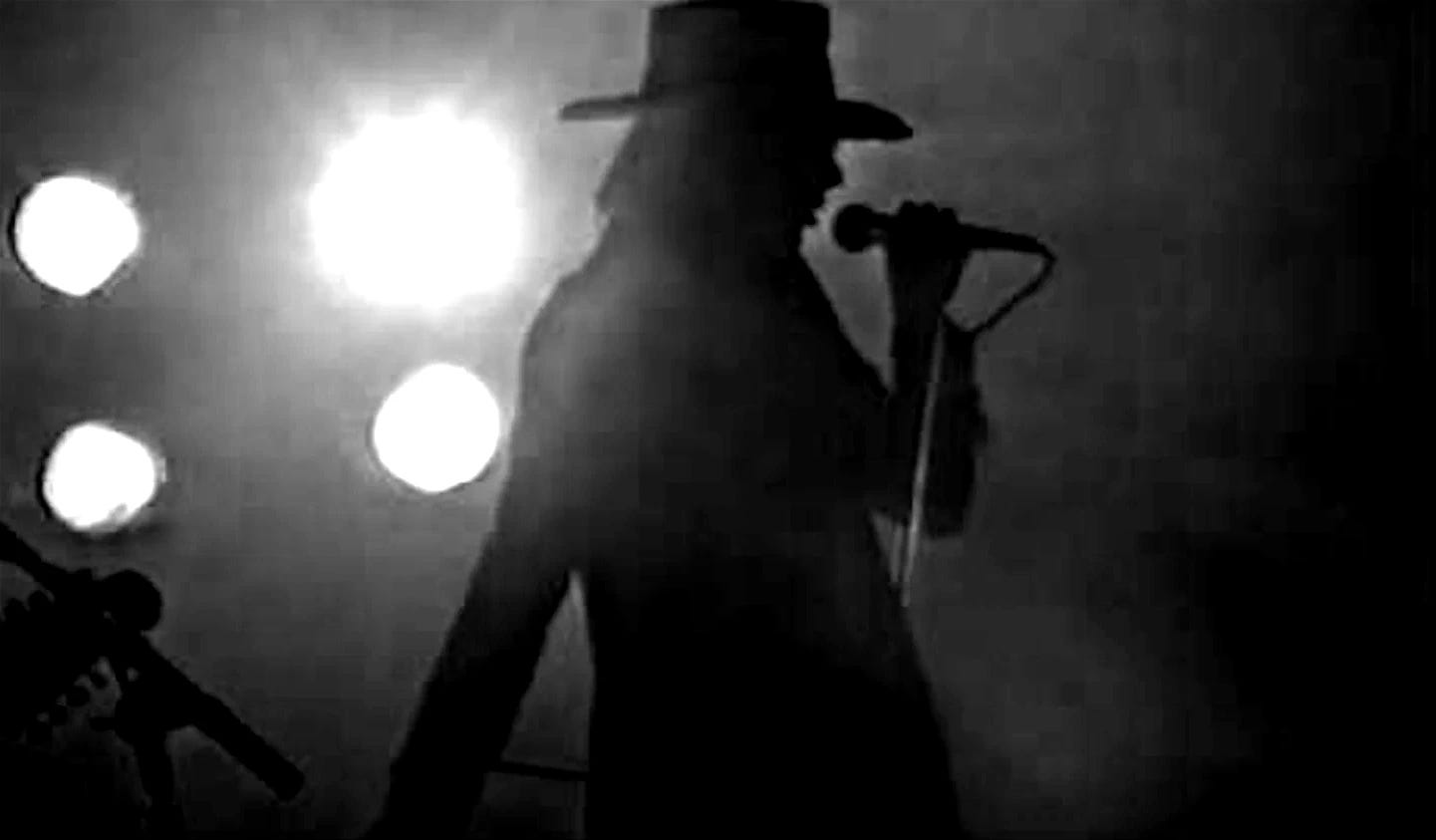
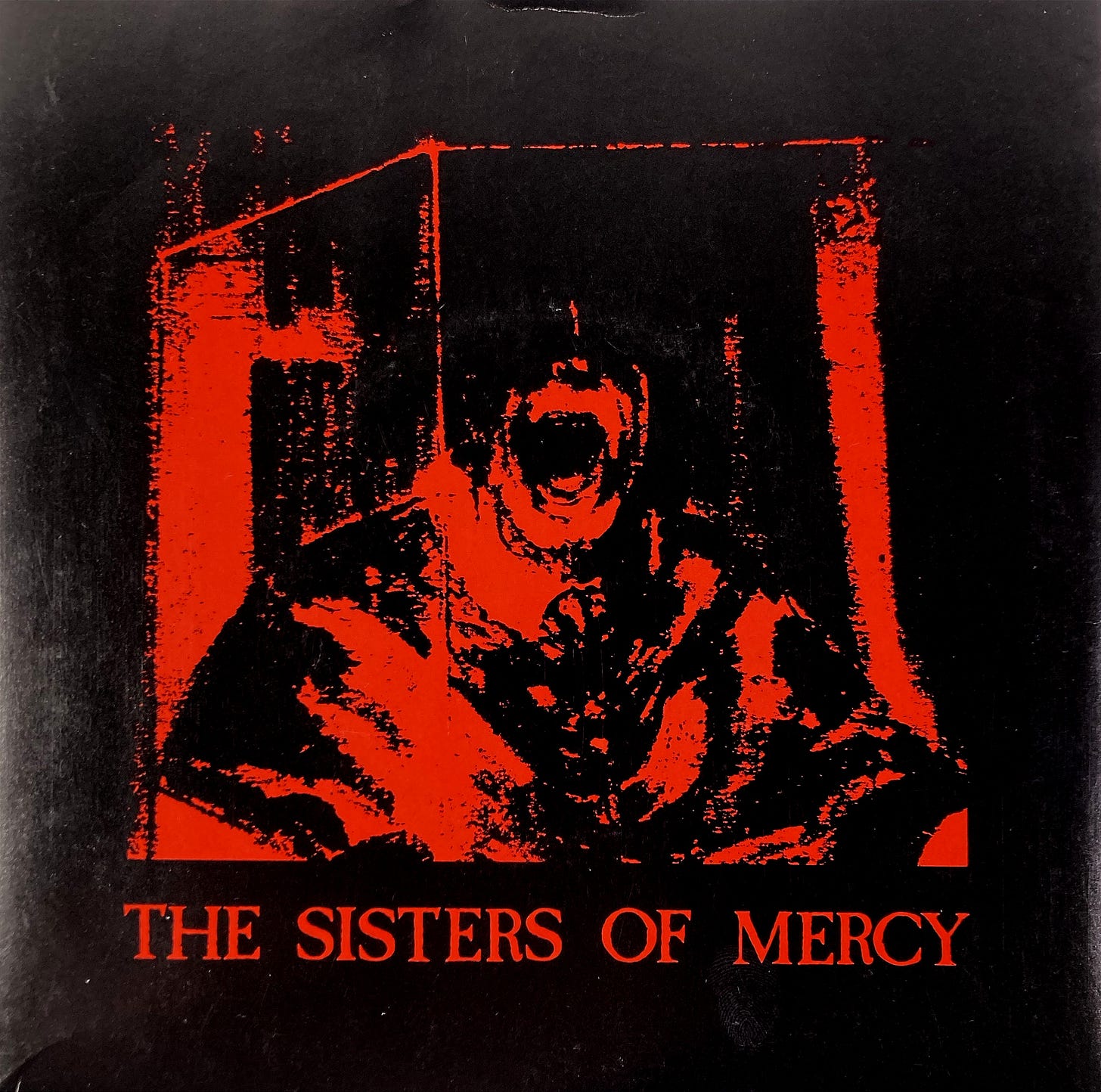
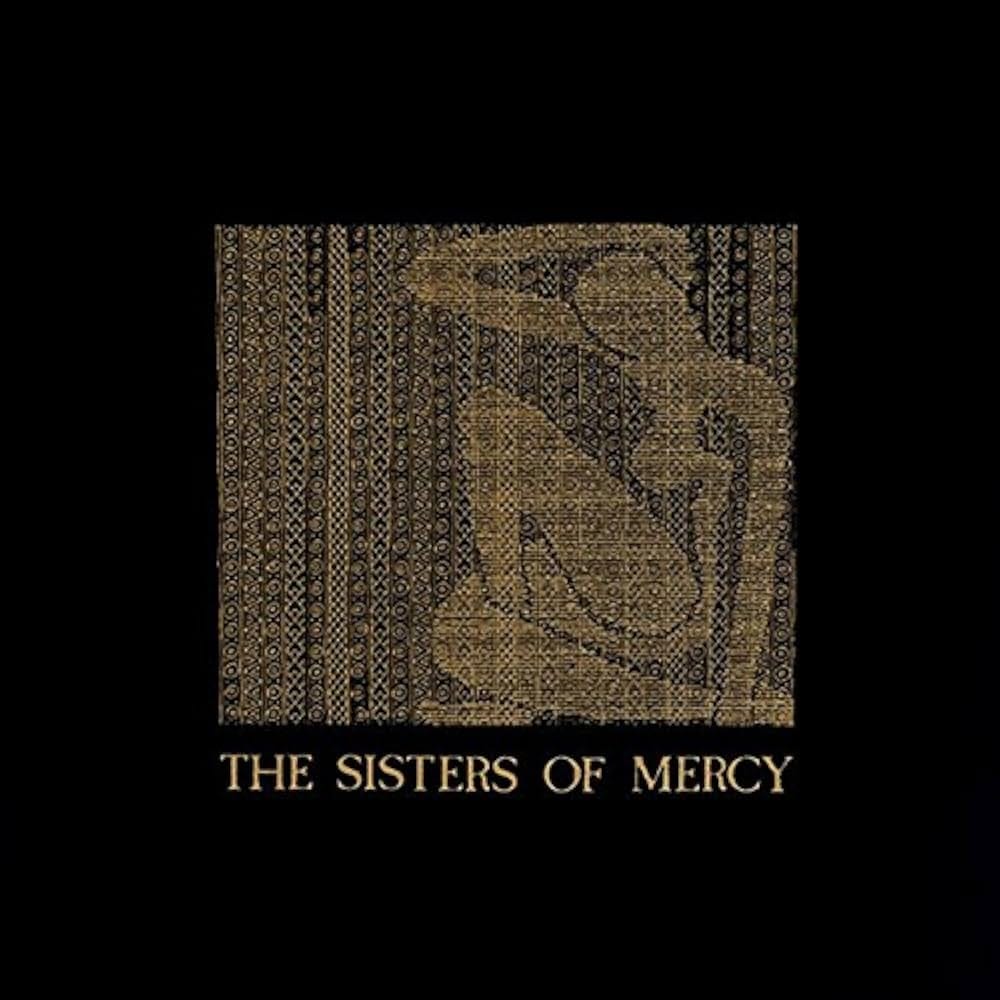
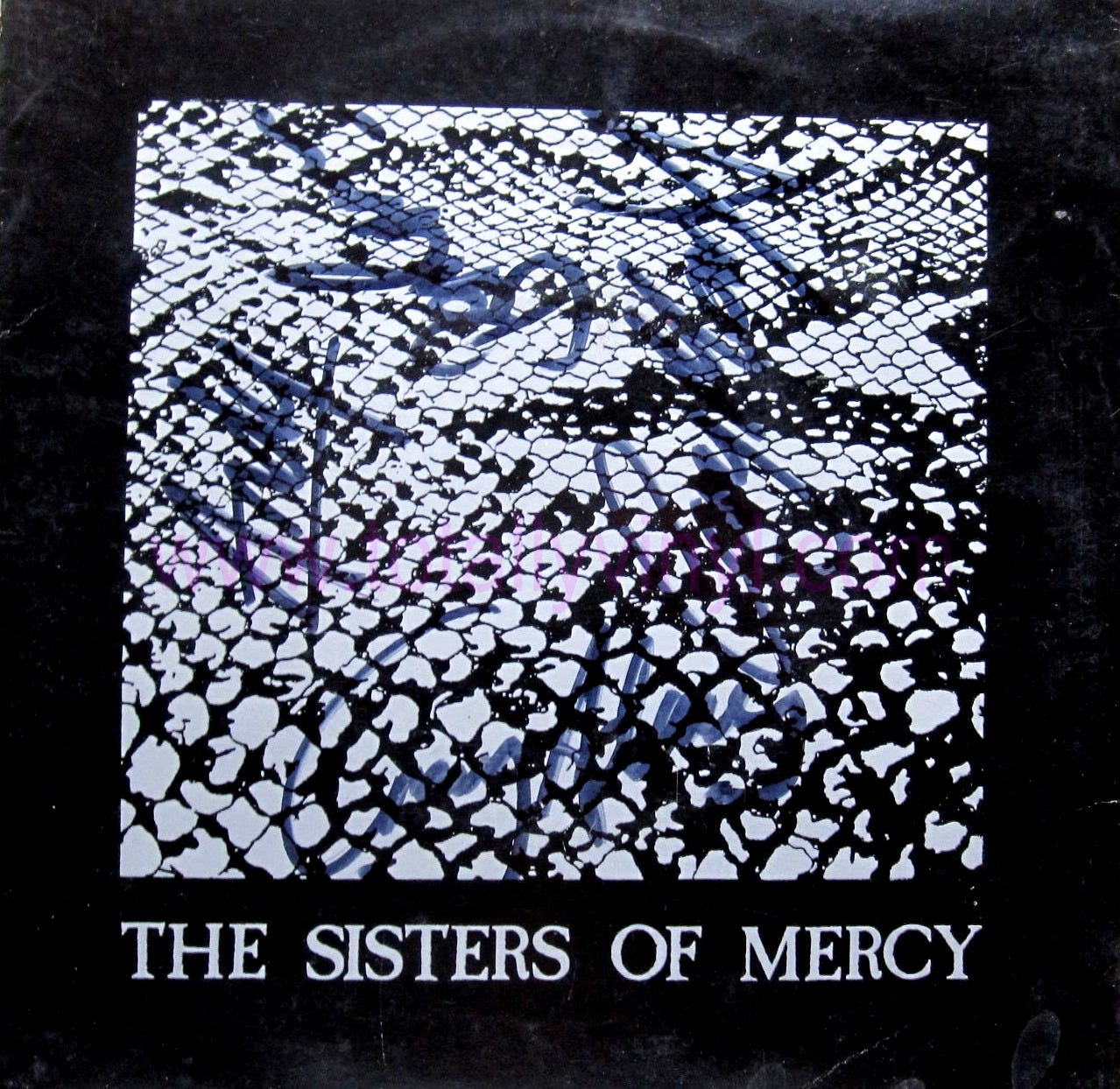
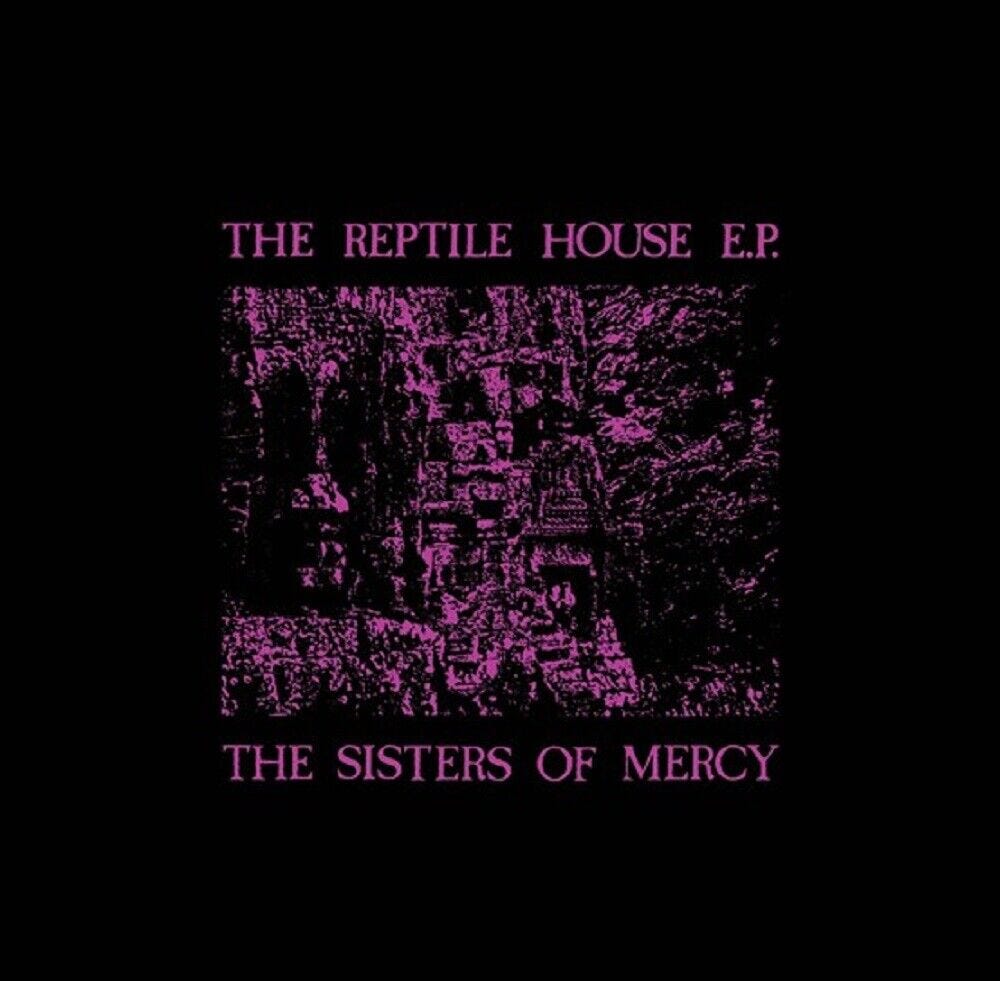
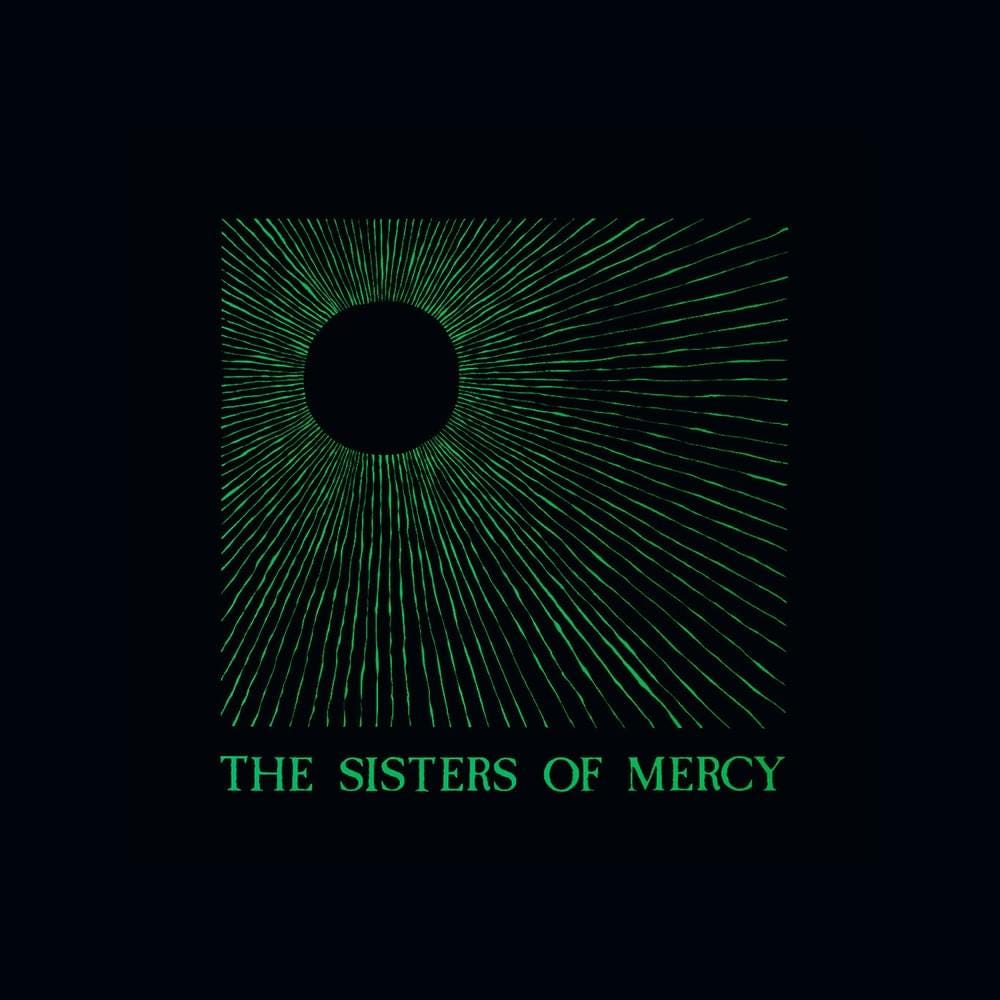
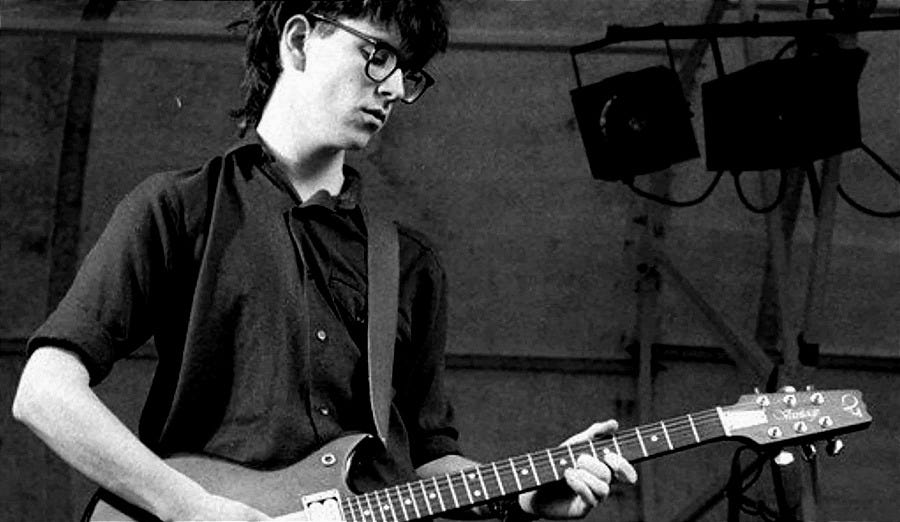
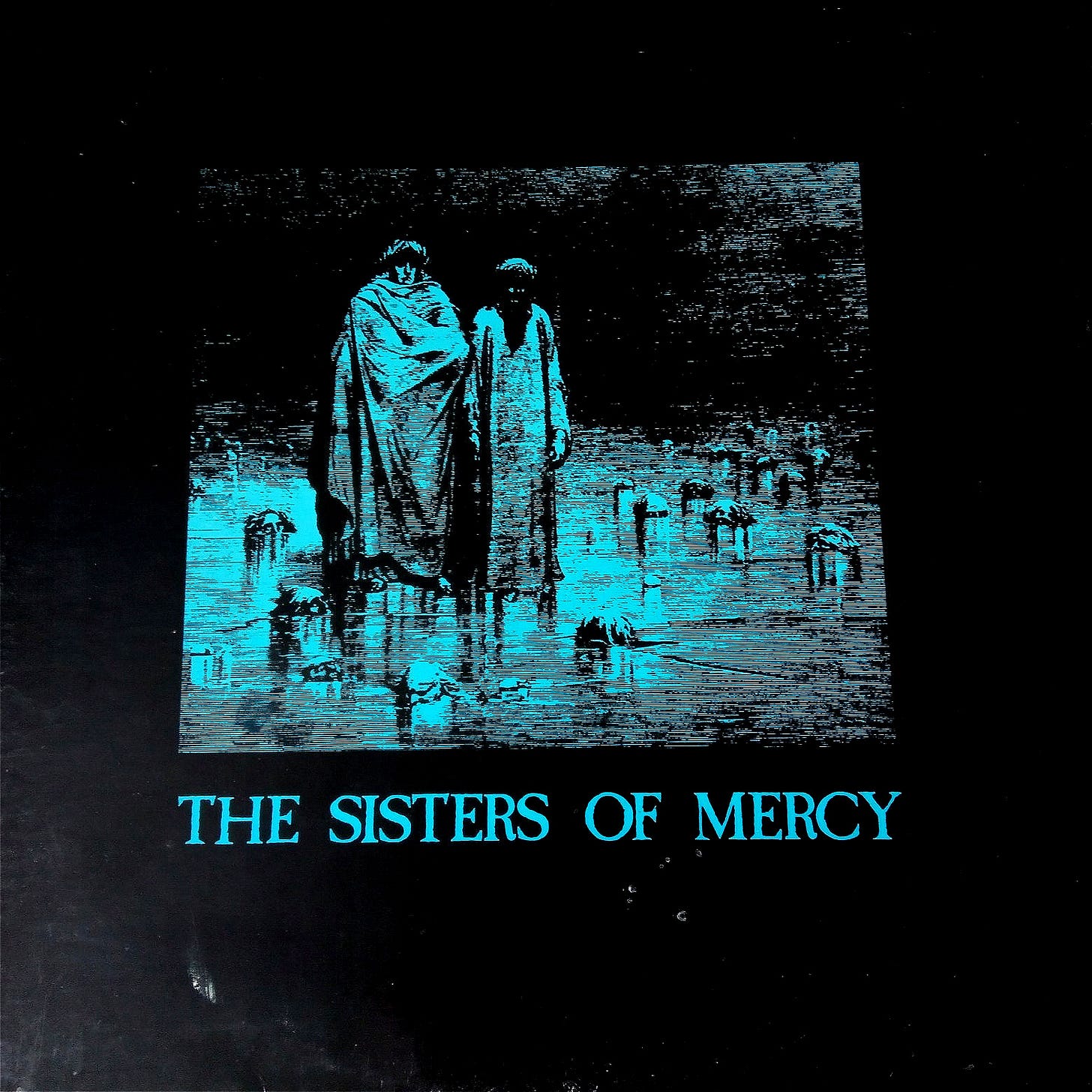
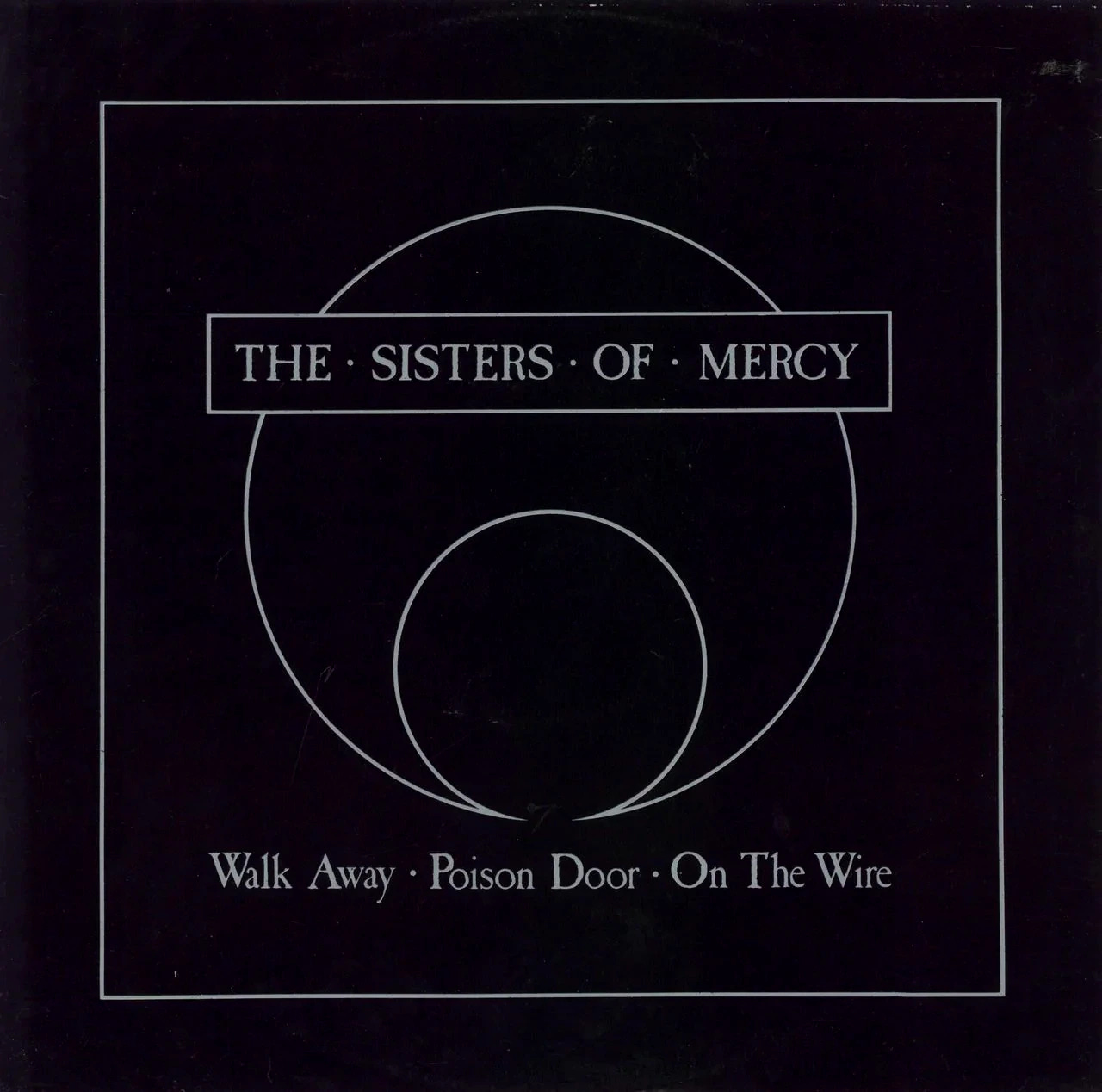
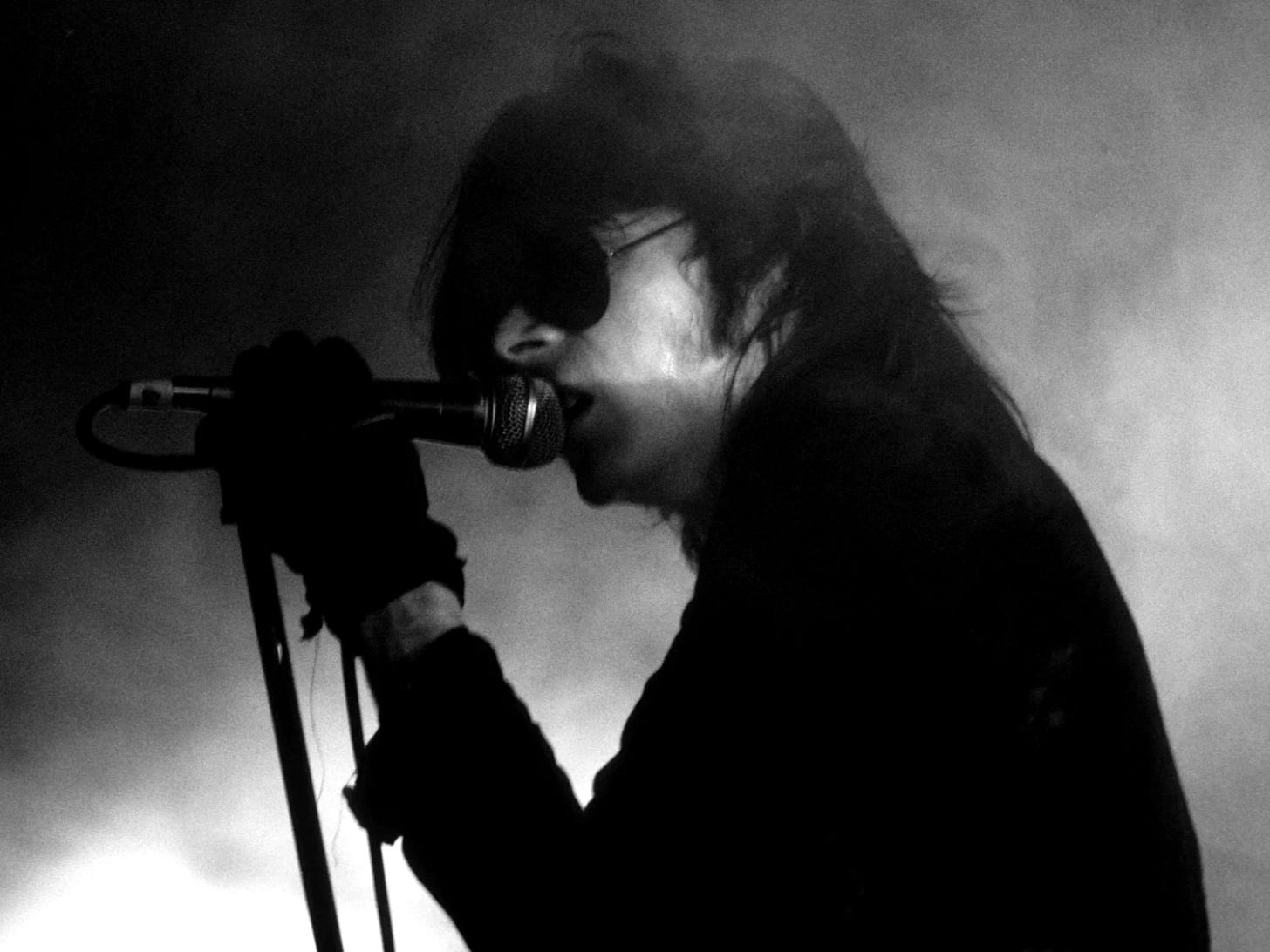

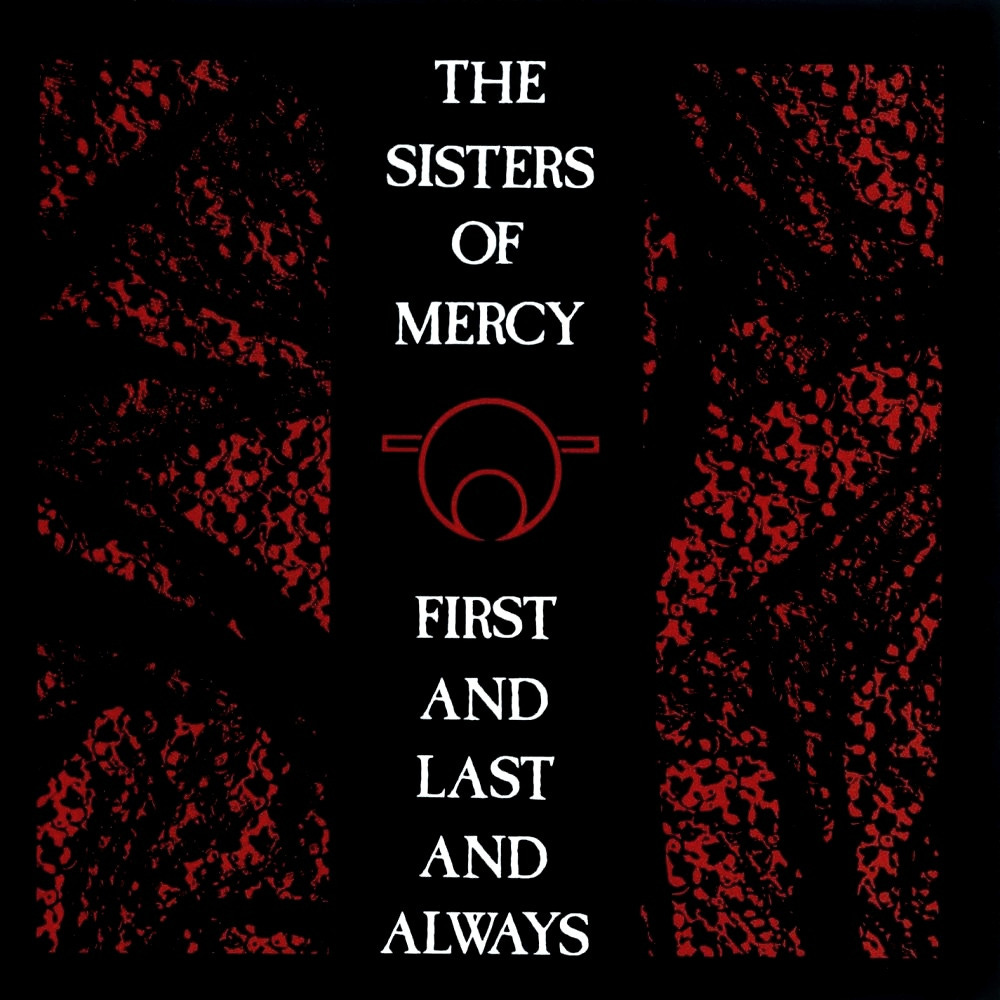
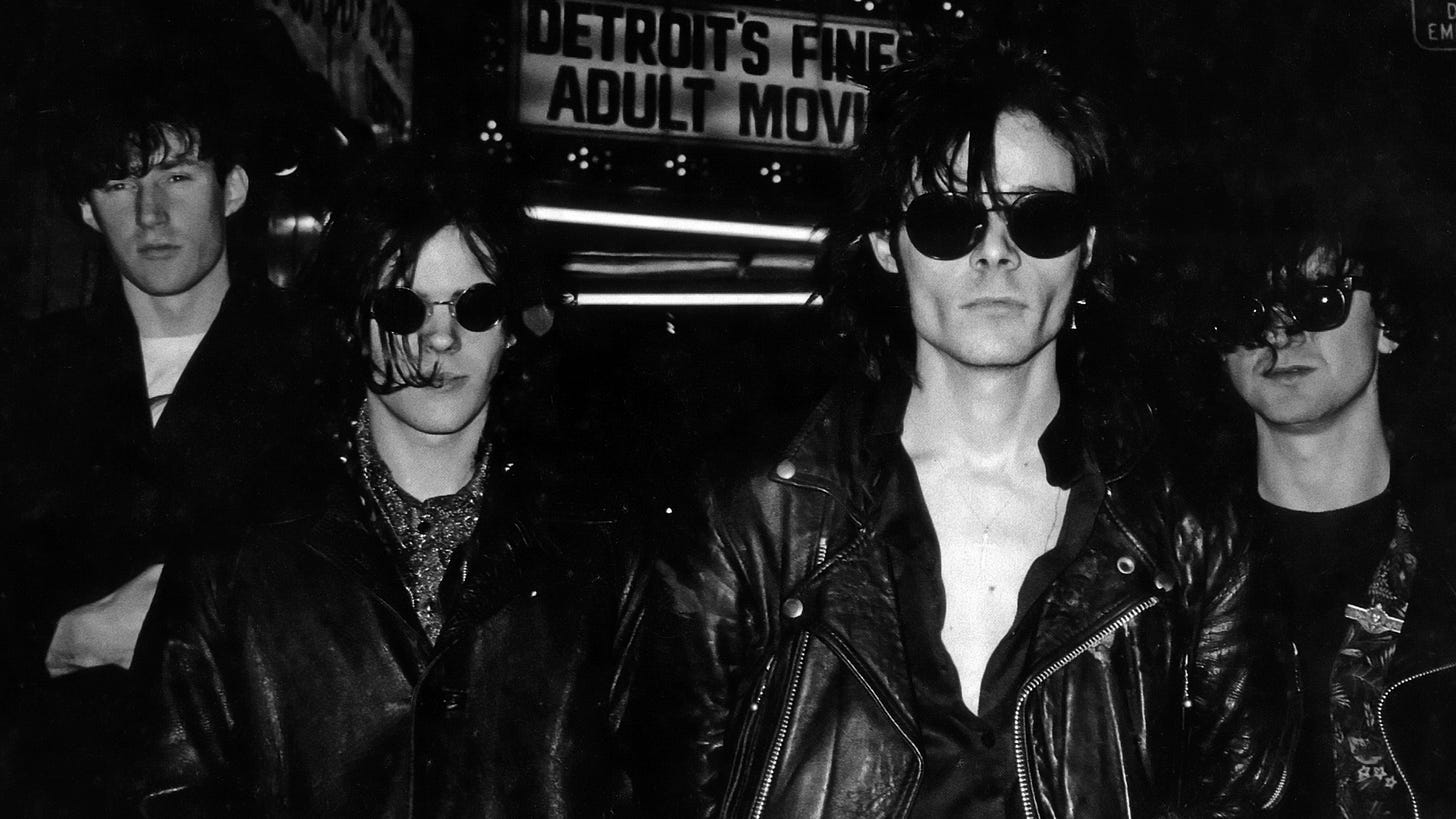

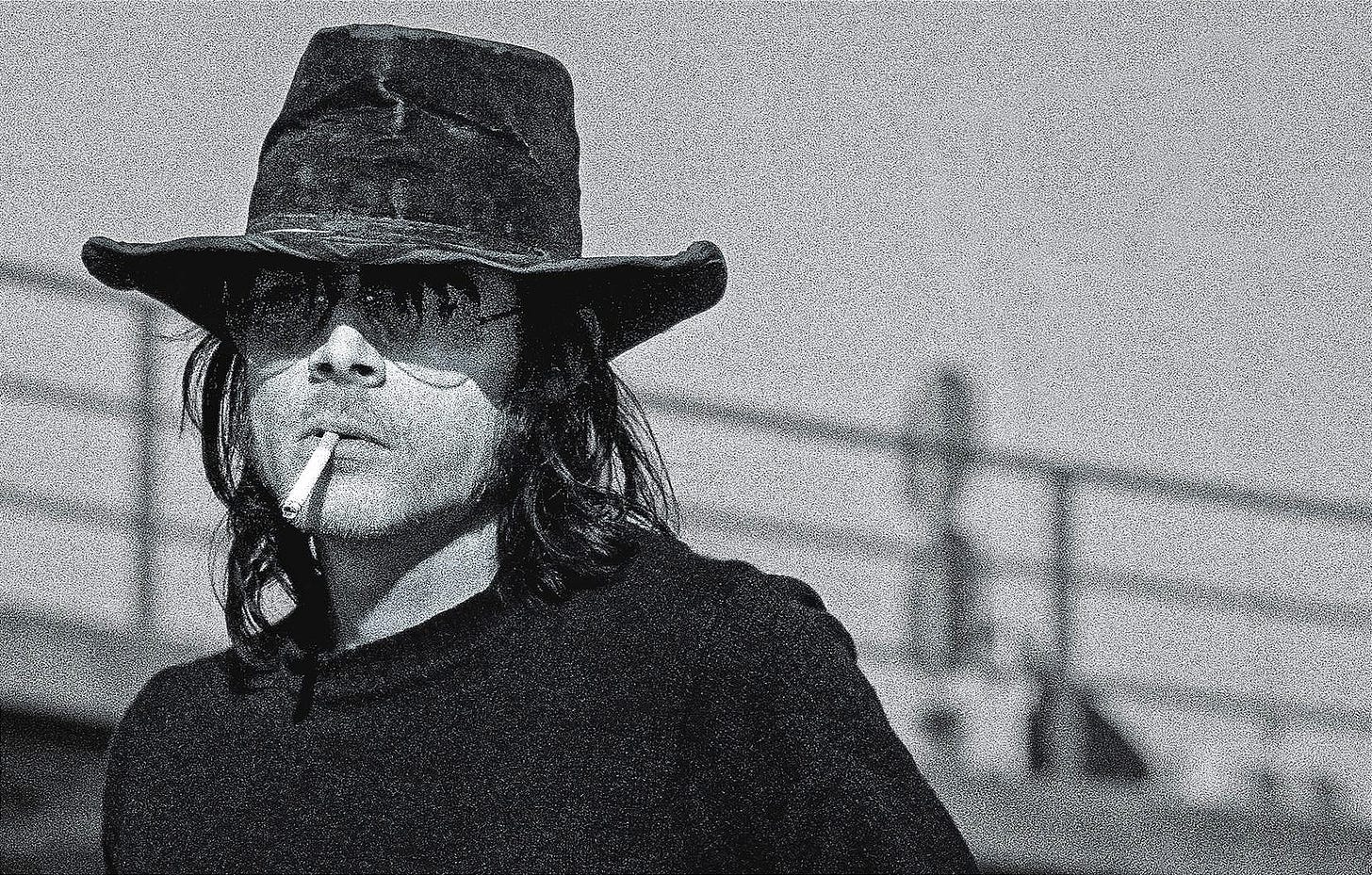
Great article! To me the Sisters 82-85 are something very special and in contrast to many others I "discovered" them only in my 40s. Reading "Paint my Name in Black and Gold" is also recommended. I use this comment to point out that "Train" is blatantly but nevertheless brilliantly ripping off "Super" by NEU!
https://www.youtube.com/watch?v=DJ4Pf-WB57U
Nice one. I loved SOM when they first came out, the first few singles, and saw them several times in Manchester, in the proto goth scene. I loved them when they were Indie. Then I thought they went a bit up themselves with the Steinman stuff, trying to go more mainstream and break USA I guess. Hmm not for me. But thats basically what youre saying. Spot on. cav x